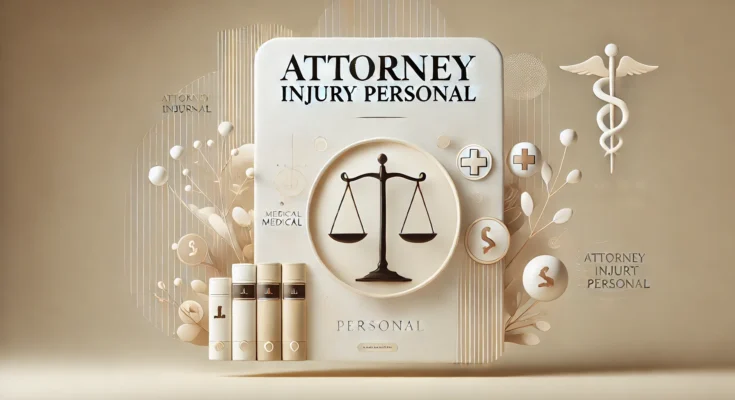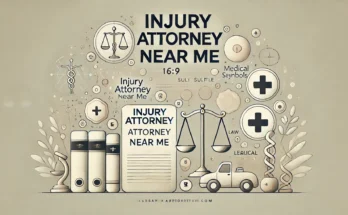Introduction
When dealing with an injury caused by someone else’s negligence, hiring an attorney for injury personal cases is critical to protecting your rights. Navigating the legal system can be overwhelming, but an experienced attorney can help you secure fair compensation for medical expenses, lost wages, and pain and suffering. From car accidents to workplace injuries, personal injury attorneys specialize in handling a variety of claims. In this comprehensive guide, we will explore why hiring a personal injury attorney is essential, how to choose the right one, and the legal process involved in personal injury cases.
Why You Need an Attorney for Injury Personal Cases
Injury cases can be complex, requiring specialized legal knowledge. Without the help of an attorney, you may not receive the full compensation you are entitled to. Here are the key reasons why hiring an attorney for your injury claim is crucial:
- Expert Legal Advice
Personal injury attorneys are familiar with the laws surrounding accidents and injuries. They understand how to navigate legal complexities, such as filing deadlines, determining fault, and negotiating with insurance companies. This knowledge ensures that you don’t miss out on important steps in your case. - Thorough Case Evaluation
An attorney can provide an accurate assessment of your injury claim’s value. They will consider factors like medical expenses, lost wages, future treatment, and emotional distress. By evaluating your case thoroughly, an attorney ensures that you receive fair compensation. - Negotiating with Insurance Companies
Insurance companies often try to minimize payouts by offering low settlements. An experienced attorney knows how to counter these tactics, negotiating for a settlement that truly reflects the severity of your injuries. - Representation in Court
If your case goes to trial, having a personal injury attorney on your side is essential. They will present your case, gather evidence, call on expert witnesses, and argue on your behalf to secure a favorable verdict.
Common Types of Personal Injury Cases
Personal injury law covers a wide range of accidents and injuries. Here are some of the most common types of personal injury claims that an attorney can handle:
- Car Accidents
Car accidents are one of the most common causes of personal injury claims. Whether caused by a negligent driver, dangerous road conditions, or faulty vehicle parts, an attorney can help you navigate the complexities of these cases. - Workplace Injuries
If you are injured on the job, you may be entitled to workers’ compensation. However, in some cases, a third-party lawsuit might be necessary if someone other than your employer is liable for the accident. A personal injury attorney can guide you through the process of obtaining compensation. - Slip and Fall Accidents
Property owners are responsible for maintaining safe conditions. When they fail to do so, and someone is injured as a result, the injured party can file a premises liability claim. An attorney can help prove that the property owner was negligent and responsible for your injuries. - Medical Malpractice
When healthcare professionals fail to provide the appropriate standard of care, it can result in serious injuries or death. Medical malpractice cases require the expertise of a skilled attorney to prove negligence and secure compensation for the victim. - Product Liability
If a defective product has caused injury, you may have a claim against the manufacturer, distributor, or retailer. A personal injury attorney will gather evidence and build a strong case to hold the responsible parties accountable.
How to Choose the Right Personal Injury Attorney
Choosing the right attorney for your injury personal case can greatly impact the outcome of your claim. Here’s what to look for when selecting an attorney:
- Experience and Expertise
Look for an attorney with extensive experience in personal injury law. Their track record in handling cases similar to yours will give you confidence that they can handle your case effectively. - Client Reviews and Testimonials
Online reviews and client testimonials can provide valuable insights into how an attorney works. Look for patterns in the feedback that indicate good communication, successful case outcomes, and a professional approach. - Clear Fee Structure
Most personal injury attorneys work on a contingency fee basis, meaning they only get paid if you win your case. Make sure you fully understand the fee structure before proceeding, and ask about any additional costs that may arise during the legal process. - Communication and Availability
Your attorney should be accessible and communicative throughout your case. Make sure they are responsive and take the time to explain the legal process to you in a way that you can understand.
The Legal Process for Personal Injury Claims
The legal process for personal injury claims involves several steps. Working with an attorney will help you navigate this process efficiently. Here’s an overview of what to expect:
- Initial Consultation
During your initial consultation, the attorney will assess your case and advise you on your legal options. This is an opportunity to ask questions and determine whether the attorney is a good fit for your case. - Investigation and Evidence Gathering
The attorney will gather all necessary evidence to support your claim, including medical records, police reports, witness statements, and photographs. They may also consult with experts to strengthen your case. - Demand Letter and Negotiation
Once the evidence is gathered, your attorney will send a demand letter to the insurance company, outlining your injuries and the compensation you seek. Negotiations may take place to reach a fair settlement. - Filing a Lawsuit
If negotiations fail to result in a satisfactory settlement, your attorney may recommend filing a lawsuit. They will prepare all legal documents and begin the formal litigation process. - Trial
If the case goes to trial, your attorney will represent you in court. They will present evidence, question witnesses, and argue your case to ensure the best possible outcome.
Common Myths About Personal Injury Attorneys
There are several misconceptions about personal injury attorneys that can discourage people from seeking legal representation. Here are a few myths debunked:
- “Hiring a Lawyer is Expensive”
Many people believe they cannot afford a personal injury attorney. However, most attorneys work on a contingency fee basis, meaning they only get paid if you win your case. - “All Cases Go to Court”
While some cases do end up in court, the majority of personal injury claims are settled out of court through negotiations. An attorney can often secure a fair settlement without the need for a trial. - “I Don’t Need an Attorney”
Handling a personal injury case on your own can be risky. Without legal expertise, you may not receive the full compensation you deserve, especially when dealing with insurance companies who aim to minimize payouts.
Conclusion
Hiring an attorney for injury personal cases is a critical step in protecting your rights and ensuring you receive the compensation you deserve. Whether you’ve been injured in a car accident, at work, or due to medical negligence, having an experienced attorney on your side can make all the difference. They will handle the legal complexities, negotiate with insurance companies, and represent you in court if necessary. Don’t delay—contact a personal injury attorney today and take the first step towards securing justice and financial recovery.

